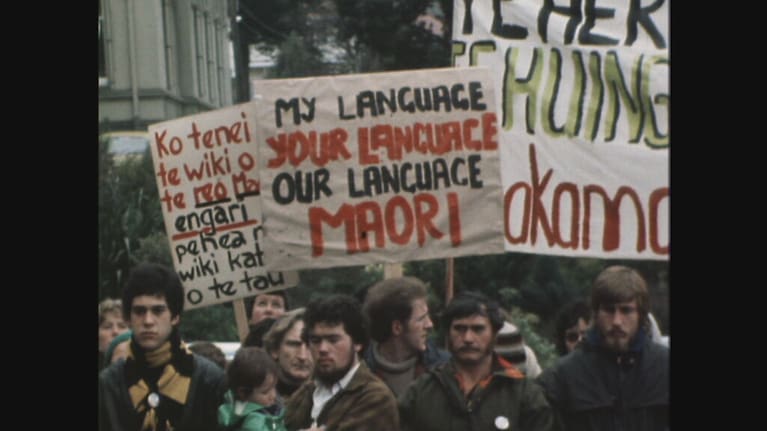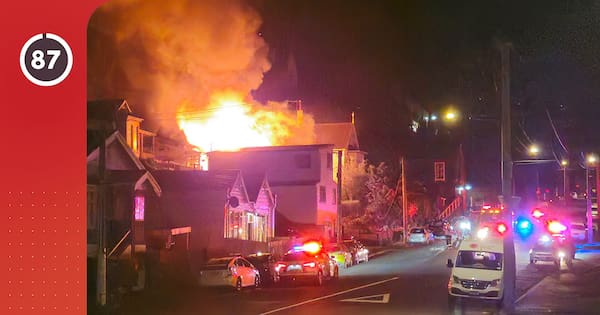This year’s Te Wiki o Te Reo Māori marks the 50th anniversary of its fight to put the language at the centre of Aotearoa’s present and future.
In response to the half-century milestone, Te Taura Whiri i te Reo Māori–Māori Language Commission is inviting the country to take on 50 reo challenges to celebrate.
Tumu whakahaere (chief executive) Ngahiwi Apanui-Barr said the challenges build on their previous campaign ‘Reo Māori Moment’ where a million people pledged and took part in a single moment in time to speak, sing, read or sign in Māori.
It’s been 50 years since the week-long celebration began, but it’s a milestone some say has been spoiled by policies they feel are taking the language backwards. (Source: 1News)
“There’s something for everyone on our list of 50 fun activities. People can choose as many as they like to help them go beyond just supporting te reo, to using it in their everyday lives.”
As well as the series of challenges, the commission is launching a digital time capsule, Te Pūtahi Mahara. Apanui-Barr said it will carry the “hopes and dreams” of Aotearoa 2025 to what will be Te Wiki’s 100th anniversary in 2075.
“What if we could hear first-hand, the dreams that those reo champions had 50 years ago? That’s what this will be – a taonga we’re creating for the reo champions 50 years in the future,” he said.
Then: Te Reo Māori 50 years ago
On September 14 1972, a group made up of members of Ngā Tamatoa, Te Reo Māori Society and Te Huinga Rangatahi (the New Zealand Māori Students’ Association) delivered the Māori language petition to Parliament.
During this time, the number of Māori speakers had declined rapidly and, by the 1980s, fewer than 20% of Māori could speak fluently.

The petition was signed by over 30,000 people, calling for schools to teach te reo Māori and Māori culture “as a gift to the Pākehā from the Māori” to promote “a more meaningful concept of integration”.
One of its key figures, 22-year-old Hana Te Hemara, who originally came up with the idea of petitioning for te reo in schools, said at the time: “We have found in the past that when Māori have brought petitions into Parliament partly the petitions have not been taken any notice of, so we use it as a political pressure to make people think about whether we ought to have Māori language in schools or not, and the reason why I brought it today was for them to discuss it now so that I feel this is the best time for them to do it.”
From then, Māori Language Day was born, and three years later in 1975, it was extended and became Māori Language Week – Te Wiki o Te Reo Māori.
Now: Te Reo Māori taking hold
Now, in a turn of synchronicity, Te Hemara’s namesake Hana-Rawhiti Maipi-Clarke is this country’s youngest politician at 23 (21 when she entered Parliament) and of the kōhanga reo generation who grew up speaking and learning in te reo.
In fact, since 2021, almost a quarter of Māori speak te reo Māori as a first language, according to Statistics New Zealand – up from 17% in 2018.
The number of students learning te reo in mainstream schools is the highest it’s been at over 220,000, and support for te reo Māori is in the millions, with three in five New Zealanders saying they believe te reo should be a core subject in primary schools.
Te Wiki o Te Reo Māori continues to grow, and a grassroots movement has extended it even further to a month-long challenge of using te reo Māori, called Mahuru Māori.
So what does its future look like?
Future: Te Reo Māori a forever language – ake, ake, ake
Te Taura Whiri has a goal of a million speakers of te reo Māori by 2040.
Given the increase in widespread support from Māori and non-Māori alike it’s an achievable one, but recent government policies have created barriers to reaching the finishing line in time.
There have been cuts to te reo initiatives such as Te Ahu o Te Reo that teaches teachers how to better integrate te reo in the classrooms, government departments have been told to limit or cut te reo Māori use in their communications and there has been a reprioritising of English over Māori in government department names and official documents like passports.

Most recently, cutting kupu Māori in structured learning books has also been described by critics as being ‘damaging’.
On the other hand, there are initiatives such as kura reo, or language schools, movements such as the Toitū Te Reo language festival, and prominent figures such as Te Arikinui Kuini Nga wai hono i te po, that are encouraging people to speak Māori to drive the momentum onward.
Will it be enough?
As Te Wiki o Te Reo Māori celebrates its 50th year anniversary, the theme this year has carried over from last year as if in defiance: Te Reo Māori a forever language – ake, ake, ake.
Only time, and perhaps the contents of Te Taura Whiri’s 50-year time capsule, will tell whether the hopes and dreams of New Zealanders for te reo Māori today match up with the reality of tomorrow.











